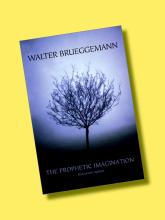Five Christian leaders on the influence of Walter Brueggemann’s classic book in their life and ministry.
Book

Among the people who Lee studies in Rescuing Jesus is Sojourners’ own Chief Church Engagement Officer Lisa Sharon Harper, who confronted the overwhelming whiteness of her evangelical campus ministry. Despite hearing otherwise from her religious leaders, she knew her whole identity as an African-American woman with a commitment to racial justice was an essential part of her faith.
And many other leaders are featured: Jennifer Crumpton, who grew up hearing conservative gender complementarian teachings, now challenges the patriarchal structures of evangelicalism through her ministry and call to lead. And there’s Will Haggerty and Tasha Magness and other LGBTQ students at Biola University, a private Christian college with explicitly anti-queer policies. Despite the threat of expulsion, these students founded an underground network of support and solidarity for LGBTQ Biolans.

A new book-length interview with Pope Francis gives fresh insight into his view of gay parishioners, marriage annulments, and other hot topics being debated by Catholics globally.
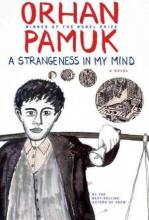
WHILE OTHER Turkish writers choose to live outside the country, Nobel Prize-winning author Orhan Pamuk—except for short periods—still lives in Istanbul, Turkey, in the building where he was raised. It is not exactly a safe, secure life. He has already faced charges for making anti-Turkish remarks regarding the long-denied mass killings of Armenians by the Ottoman Empire during World War I. He fled the country for more than a year until charges were dropped (due in part to pressure from high- profile writers that included Gabriel García Márquez). And since then, numerous other writers and journalists have been arrested by the increasingly authoritarian government.
Pamuk’s newest and ninth novel, A Strangeness in My Mind, took him six years to write and release, as he has struggled against conservative forces who call him a “Western stooge.” Like Istanbul: Memories and the City, a memoir by Pamuk, A Strangeness in My Mind is a double portrait of the main character, Mevlut Karataş, and the city of Istanbul. It is a postmodern fairy tale, a mesmerizing odyssey, a coming-of-age urban fable.
Mevlut is a street vendor who sells a fermented wheat drink, boza, which became popular in the days of the Ottoman Empire. Through Mevlut’s prism we become acquainted with a city of 14 million—up an astounding 12 million people since Pamuk was born in 1952. Pamuk has described Mevlut “as a man of immense imagination ... he sees and feels things in the streets that no one else does.” He is a quietly observant Muslim, modest, shy, and with his own inner sense of holiness and of “strangeness.” Like Pamuk’s own character in Istanbul, Mevlut is a lonely dreamer, living outside of the mainstream, caught up in his own imaginary world, often being judged harshly by those around him.
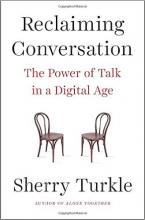
THE GLORY OF God is humanity fully alive, to paraphrase St. Irenaeus.
If Irenaeus is correct and Christian discipleship is centered on following Jesus toward a life that is more compassionate and more alive, then Sherry Turkle’s new book, Reclaiming Conversation: The Power of Talk in a Digital Age, is perhaps the most important Christian book of 2015. Granted, Turkle steers clear of the language of faith, but in calling us to become more fully human, she has penned a profoundly religious book that Christians need to read and reflect upon.
Western culture has long been losing the capacity for conversation. Embodied in the current partisan climate of Washington that competes at all costs, rather than converse and collaborate, this aversion to dialogue is symptomatic of cultural changes that have unfolded over the last 500 years. From Enlightenment philosophy to industrialization to automobility, these cultural shifts have disintegrated communities and diminished our capacity for open conversation. More recently, Bill Bishop’s 2008 book The Big Sort highlighted how the increasing homogeneity of our relational networks erodes our capacity to converse with those who differ from us.
Turkle focuses primarily on an even more recent concern, the ubiquitous tyranny of the smartphone. Although not a Luddite who would advocate abolishing phones, Turkle fiercely describes the ways our phones inhibit our capacity for connection, conversation, and empathy. “We are being silenced by our technologies,” she maintains. With joint Harvard doctorates in sociology and psychology, Turkle backs her claims with a vast body of research. Even a silenced phone sitting on the table during conversation, she notes, changes the dynamics of what we discuss and how.
Face-to-face conversation, Turkle argues, is the most basic human activity. In conversation, we learn to listen and to be empathetic. Our mobile devices also impede our capacity for solitude, a skill that is vital to our development from childhood onward. Turkle emphasizes that it is in solitude that our minds are formed and we develop a distinctive voice. In exercising this voice in private conversations with family, friends, and lovers, and in public conversations, it is refined and our capacity for solitude and self-reflection is further enhanced, drawing us ever-deeper in this virtuous cycle.

A Good Neighbor
Children’s television host (and Presbyterian minister) Fred Rogers was known for his gentle, soft-spoken manner. Michael G. Long argues in Peaceful Neighbor: Discovering the Countercultural Mister Rogers that Rogers was also a radical, imbuing his show with nonviolence and care for creation. Westminster John Knox Press

“There are lots of books out there about why you should not believe in God,” Bayer said. “But there aren’t any about what do secular people believe in. I think that’s the question John and I felt hadn’t been adequately addressed.”
In exploring that, the two men — both whom have studied philosophy and logic — came up with 10 essentials. For the extra-nerdy, there’s even “a theorem of belief” in the appendix that looks like something a mathematician might scribble.
The result is 10 “non-commandments” — the authors’ irreducible statements of atheist and humanist belief.
First up: “The world is real, and our desire to understand the world is the basis for belief.”
No. 2 on the list: “We can perceive the world only through our human senses.”
Halfway through, at No. 5, the authors conclude: “There is no God.” Once over that hurdle, the non-commandments become less controversial — an ethical society is good, as is moral behavior.
THE CRY OF the church to the world should be “Forgive us.”
At a time when the American church struggles with finding its place in the world and struggles with asserting its identity, could the church be known as the community that models confession, repentance, and the seeking of forgiveness? At this moment in history, the American church is often ridiculed or portrayed as unforgiving and ungracious. Could the church offer a counter-narrative, not of defensiveness or derision but of an authentic confession and genuine reconciliation? By examining seven different areas where the church has committed sin, we ask the church to consider the spiritual power and the theological integrity of a church that seeks forgiveness for those sins.
Our scriptures testify to the necessity of confession. Confession is central to the Christian faith. The importance of confession arises from the Christian view of sin. Sin is a reality and must be taken seriously. Evangelicals consistently begin our gospel presentation with the centrality of sin to the human experience. American evangelicals often assert that the beginning of the work of God’s forgiveness is the recognition of our need for God because of human sinfulness.
It is antithetical to the gospel when we do not confess all forms of sin—both individual and corporate. The reason evangelicals can claim to be followers of Jesus is because there has been an acknowledgement of sin and the seeking of God’s grace through Jesus Christ that leads to the forgiveness of sin.
IN 1998, AWARD-WINNING writer Linda Lawrence Hunt and her husband, Jim, were forced to consider a question no parent wants to ask: How do you find meaning in life after losing your child?
Their 25-year-old daughter, Krista Hunt Ausland, had just died in a bus accident in Bolivia while volunteering with the Mennonite Central Committee.
“Your joys become more intense,” consoled a friend whose family had also lost a child.
This resonated with Linda, especially since Krista was known for her energy and enthusiasm. Linda and her husband, now retired professors of English and history at Whitworth University, had always encouraged Krista to travel and take part in community service, but even they were amazed by the intense joy Krista exuded serving as a school teacher in inner-city Tacoma, Wash., or volunteering in poor communities in Latin America. Writing about that joy might help to recover some of it in Linda’s own life, she thought.
Fifteen years later, Linda’s newest book is more than just an ode to a remarkably happy daughter. Pilgrimage through Loss: Pathways to Strength and Renewal after the Death of a Child is a collection of ideas and insight from more than 30 parents who decide in their darkest hours to “face grief in creative and intentional ways.” The book, which contains study questions at the end of each chapter and references new research on grief, is intended as a resource for grieving parents, as well as for those hoping to support them in the right ways and at the right times. “Closure is an illusion,” explains Linda, but she describes multiple examples of parents finding strength and even joy in sacred spaces and rituals, as well as in giving and receiving symbolic acts of kindness.
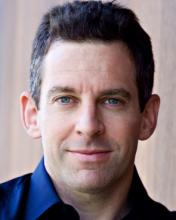
Uber-atheist Sam Harris is getting all spiritual.
In his new book, “Waking Up: A Guide to Spirituality Without Religion,” the usually outspoken critic of religion describes how spirituality can and must be divorced from religion if the human mind is to reach its full potential.
“Our world is dangerously riven by religious doctrines that all educated people should condemn,” he writes in the book, but adds: “There is more to understanding the human condition than science and secular culture generally admit.”
The prescription, Harris holds, is Buddhist-based mindfulness meditation. A Stanford-trained neuroscientist, Harris is a long-time practitioner of Buddhist meditation. He said everyone can, through meditation, achieve a “shift in perspective” by moving beyond a sense of self to reach an enlightening sense of connectedness — a spirituality.
During his 1930-31 fellowship at Union Theological Seminary in New York City, German theologian Dietrich Bonhoeffer joined his African American classmate Albert Fisher as a regular attendee at Abyssinian Baptist Church in Harlem.
WHEN BONHOEFFER entered Harlem with Fisher, he met a counternarrative to the white racist fiction of black subhumanity. The New Negro movement radically redefined the public and private characterization of black people. A seminal moment in African American history had arrived, and all of Bonhoeffer’s descriptions of his involvement in African American life during his Sloane Fellowship year occurred during this critical movement. He turned 25 that February. Bonhoeffer was experiencing that critical moment in African American history while he was still young and impressionable.
The New Negro, a book containing a collection of essays, was edited by one of the leading intellectual architects of the movement, Alain Locke. The New Negro, as Locke and his authors appropriated the term, described the embrace of a contradictory, assertive black self-image in Harlem to deflect the negative, dehumanizing historical depictions of black people. The New Negro made demands, not concessions: “demands for a new social order, demands that blacks fight back against terror and violence, demands that blacks reconsider new notions of beauty, demands that Africa be freed from the bonds of imperialism.” Bonhoeffer knew the movement by the descriptor New Negro, but James Weldon Johnson preferred to describe the movement as the Harlem Renaissance ... as a rebirth of black people rather than something completely new. ...
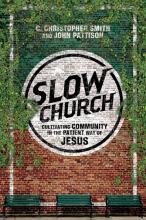
HERE’S WHAT Slow Church is not: A how-to manual with five easy steps to make your congregation more thoughtful. A celebration of how using the word “community” often on your church website will multiply your pledge and attendance numbers. An ode to really, really long worship services.
Rather, Slow Church explores being church in a way that emphasizes deep engagement in local people and places, quality over quantity, and in all things taking the long view—understanding individuals and congregations as participants in the unfolding drama of all creation. Authors C. Christopher Smith and John Pattison are self-proclaimed “amateurs,” insofar as they are writers-editors and lay leaders, not professional pastors, theologians, or congregational consultants. But this book is richly informed by their experience in their own church contexts (Englewood Christian Church in a gritty neighborhood in Indianapolis for Smith; an evangelical Quaker meeting in small-town Oregon for Pattison), conversations with other church communities, and close reading of classic and contemporary literature on culture, Christian community, scripture, and spirituality
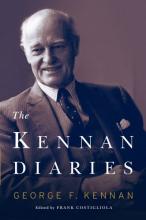
THE KENNAN DIARIES, carefully edited by Frank Costigliola, a University of Connecticut historian, covers an amazing and sometimes disturbing 88-year period of personal journal-writing by George F. Kennan, who became the most famous diplomat-intellectual of the 20th century.
Born in 1904 (he died in 2005) Kennan, a Milwaukee native, grew up in an upper-class Scotch-Irish Presbyterian family with three older sisters and a father who was a tax attorney.
After graduating from Princeton, Kennan became a Foreign Service officer with the State Department, eventually serving in posts throughout Europe. But Kennan’s first love was Russia. He wrote in his diary that “he had a mystical connection to Leningrad, as though he had once lived there.” He was offered a three-year university stint in Berlin by the State Department—Kennan’s boss wanted him to be educated like a pre-Bolshevik Russian gentleman. Kennan’s grasp of the Russian language and history became exceptional. Together with his prodigious analytical skills, it would be the foundation of his brilliant career.
After 20 years abroad, Kennan fired off his famous 5,540-word “Long Telegram” on Feb. 22, 1946, from Moscow to Washington. Soon afterward, in July 1947, he wrote another piece in Foreign Affairs under the byline “X.” In the two pieces he said that the Soviets under Stalin would try aggressively to expand, but that the U.S. should not employ military means to stop them. Instead, Kennan advocated “containment,” heavily monitoring the Russians with hard-headed diplomacy and tough talk. He also stated that the Soviet Union would eventually self-destruct.
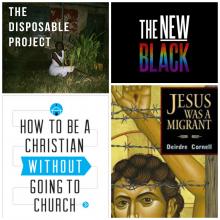
THROUGH THEIR EYES
In 2011, Raul Guerrero provided 100 Kodak disposable cameras and taught basic photography skills to nine young students in the Newlands area of Moshi, Tanzania. The Disposable Project book brings together their images of their community, with text by Guerrero. the-disposable-project.com
JOURNEYING
“Migration has been, for centuries, not only a source of controversy but a source of blessing,” Deirdre Cornell writes in Jesus Was a Migrant. Inspired by ministering among immigrants in different settings, this is a beautifully written set of deeply humanizing reflections on the immigrant experience and Christian spirituality. Orbis Books
FAITH-ROOTED Organizing: Mobilizing the Church in Service to the World outlines a theological cartography of social change. In this critical intervention, Alexia Salvatierra and Peter Heltzel reimagine—and as a necessary consequence, rechart—the landscape of vision, action, and strategic planning needed for social change.
Full disclosure: I have attended several trainings conducted by the co-authors. Indeed, the dual authorship of the text is a principal strength. Faith-Rooted Organizing blends the voice of an evangelical-activist theologian in Heltzel with the homespun profundity of a seasoned pastor and campaign organizer in Salvatierra. The authors delight readers with complementary writing styles: Heltzel speaks through theological propositions, interpolated intermittently with jazz references and theological punch lines; Salvatierra communicates through proverbs, organizing anecdotes, poignant biblical passages, and narrative side notes.
The result is a well-argued and accessible text that should resonate from the seminary to the sanctuary. Their driving thesis is that faith communities, especially Christian ones, should organize for social change in a way that is rooted and guided by the stories, symbols, sayings, and scriptures of our faith. Faith-Rooted Organizing functions as an instruction manual on effective advocacy while providing a theological rationale and vocabulary for a vocation marked by tremendous victories and colossal failures, breakthrough partnerships and fragmented coalitions, glimpses of beloved community and portraits of democracy stillborn.
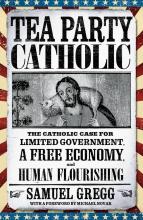
WHAT IS THE relationship between one’s religious beliefs and one’s economic and political views? Are some religious beliefs more “American” than others?
These questions come to mind in reading Samuel Gregg’s Tea Party Catholic: The Catholic Case for Limited Government, a Free Economy, and Human Flourishing. Gregg suggests that religion directly informs—or should inform—our understanding of political and economic issues and that religious, economic, and political liberty are inextricably bound. A perceived or real “attack” on one, he contends, is an attack on all.
Gregg is director of research for Acton Institute, a libertarian think tank whose core principles seek the “integrating [of] Judeo-Christian truths with free market principles.”
In Tea Party Catholic Gregg writes of a “new type of Catholic American” who is grounded in a “dynamic sense of orthodoxy” but whose “Americanness” is defined by faith in free market principles. Tea Party Catholic details how free market principles and a view of government “with clear but constrained economic functions” have, Gregg argues, not only deep roots in U.S. political history but also in Catholic tradition. Thereby, he suggests, any U.S. Catholic differing in his or her economic and political beliefs has neither a proper understanding of the United States’ founding nor of the teachings of the Catholic Church.
Gregg’s attempt to sacralize libertarianism is not consistent with Catholic doctrine: It runs counter to stated positions of the Vatican and the majority of Catholic theologians and economists. At a recent conference at The Catholic University of America one of Pope Francis’ advisers, Cardinal Oscar Rodríguez Maradiaga, said that in commenting on free market and libertarian influences on our global economy, Pope Francis gave a “sharp prophetic verdict: ‘This economy kills.’”
YOU DON’T HAVE to be an environmentalist to wonder about technology. Will it be our great savior or another thorn in the flesh, another opportunity to hear Thoreau’s lament about the tendency of humans to “become the tools of their tools”?
This excellent collection of prayers and worship materials, From the Psalms to the Cloud, helps us understand the tool of technology. It is a very green book while also being useful. It is green because it gives us a way out of the totalitarian world of the market and into a world that we make with words.
Just about everybody is on the other side of the “time famine” and the “trust famine” and deep into digital and connectivity overload. By time famine I mean the pervasive sense that there is not enough time to do what we want, so subjugated is our time to technology, forms, and robotic requests for information. By trust famine I mean all that time we spend worrying about time and wondering if somebody else is in charge. Are we in charge of our tools and our time or are our tools and time in charge of us?
In this optimistic book, the prophets arrive. Mankin and Tirabassi ask the right question: Can a technology devoted to advertising be useful to spirituality? They answer with a careful yes, taking us on the long road from the Psalms to Twitter, by way of “vintage wine in vintage wineskins, uncorked.” These two writers gather the wisdom of dozens of beautiful writers of prayers and liturgies and show us a way to go deep digitally. Whether they are praying for energy that will “deeply change all of our clocks,” or for the return of the time when churches giving sanctuary for immigrants will become again “dusty places with pews,” or in any of John Dannon’s exquisite doxologies for the natural and ecclesiastical seasons, or encouraging us to “spend a day saying nothing that doesn’t need saying.” The prayer topics move through addiction to pregnancy to a ritual for quitting a job. What a great ask this is for those confused or overdone with technology: We pray “for a trap door when we hit rock bottom.”
FORGIVENESS IS wholeness, Nobel Peace Prize winner Archbishop Desmond Tutu and his daughter, Anglican minister Rev. Mpho Tutu, write in their newest collaboration,The Book of Forgiving. Scientific research shows that forgiveness has the power to transform us in spiritual, emotional, and even physical ways. That evidence is paired with the Tutus’ collective experience in counseling, studying, and teaching and their personal stories about the difficulty of forgiving. Archbishop Tutu writes about learning to forgive his abusive father. Mpho, who writes about learning to forgive the man who murdered her housekeeper in her home, is pursuing a PhD in the topic of forgiveness.
The book lays out some simple but critical truths: Everyone can be forgiven. Everyone deserves forgiveness. You must be willing to forgive. Forgiveness is not a weakness, nor a luxury. Forgiving others is a way to practice forgiving yourself. Through forgiveness, we all become whole again. Unconditional forgiveness is an act of grace that frees all parties from further indignity, and from self-blame and corrosive hatred.
The path to forgiveness seems simple enough when you can navigate it in four easy-to-follow steps: Tell the story. Name the hurt. Grant forgiveness. Renew or release the relationship. The path is also—sorry—a bit pedestrian. That doesn’t mean the route map isn’t useful. But the book will be most applicable if you have struggled to forgive or feel that even contemplating forgiveness is an impossible burden weighing heavy on your heart and soul. If you’re carrying a load you can’t seem to gracefully shrug off or leave by the side of the road, the Tutus can help you chart the course.
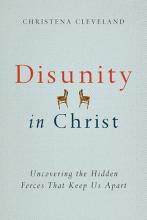
OVER THE PAST 2,000 years, Christians have found myriad ways to divide the body of Christ. We are now more divided than ever, with more than 40,000 Christian denominations worldwide. Perhaps, in this context, we are asking the wrong questions. Do we really understand God’s desire for the church to be one? Do we as individuals have a yearning for the unification of the body of Christ? Why do we create the divisions we create? Why do we maintain the divisions that already exist? How can we break through these barriers to heal a broken church?
Christena Cleveland sets out to answer all of these questions and more in her latest book, Disunity in Christ. Cleveland is a young, energetic, and brilliant teacher, speaker, and researcher in the fields of social psychology and faith and reconciliation. For those concerned with reconciliation in the church, which should be all of us, hers is a voice to take seriously.
In Disunity, Cleveland quickly breaks the ice by poking fun at herself and by pointing to her own personal prejudices and biases that have led to her categorically labeling fellow brothers and sisters in Christ as either a “right Christian” or “wrong Christian.” The reader is immediately able to connect with her and realize the ways in which we have created division in our own lives, whether because of race, gender, orientation, education, location, socio-economic status, theology, or political affiliation. It also becomes apparent why we prefer our homogenous groups.
Matthew Vines sits down with Sojourners to discuss his first book, "God and the Gay Christian: The Biblical Case in Support of Same-Sex Relationships."
